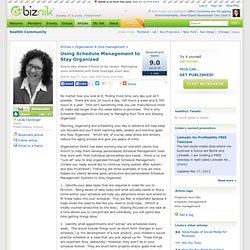

Time management, Portent-style. Using Schedule Management to Stay Organized. No matter how you look at it, finding more time very day just isn't possible.

There are only 24 hours a day, 168 hours a week and 8,760 hours in a year. Time isn't something that you can manufacture more of, make last longer than the week before or purchase. This is why Schedule Management is the key to Managing Your Time and Staying Organized. Planning, organizing and scheduling your day in advance will help keep you focused and you'll start reaching daily, weekly and monthly goals and Stay Organized. Which will, of course, ease stress and anxiety, reduce the aging process and give you peace of mind. Organization Direct has been working one-on-one with clients this month to help them develop personalized Schedule Management tools that work with their individual personalities and needs. 1. What Successful People Do With The First Hour Of Their Work Day. Remember when you used to have a period at the beginning of every day to think about your schedule, catch up with friends, maybe knock out a few tasks?

It was called home room, and it went away after high school. But many successful people schedule themselves a kind of grown-up home room every day. You should too. The first hour of the workday goes a bit differently for Craig Newmark of Craigslist, David Karp of Tumblr, motivational speaker Tony Robbins, career writer (and Fast Company blogger) Brian Tracy, and others, and they’ll tell you it makes a big difference.
Here are the first items on their daily to-do list. Don’t Check Your Email for the First Hour. Tumblr founder David Karp will "try hard" not to check his email until 9:30 or 10 a.m., according to an Inc. profile of him. If you need to make sure the most important messages from select people come through instantly, AwayFind can monitor your inbox and get your attention when something notable arrives. Choose Your Frog. To-Do Lists Don't Work - Daniel Markovitz. By Daniel Markovitz | 2:11 PM January 24, 2012 Stop making to-do lists.

They’re simply setting you up for failure and frustration. Consider the to-do lists you’re currently managing: how many items have been languishing since Michelle Bachman was leading the field for the Republican nomination? How often do you scan your list just so that you can pick off the ones you can finish in two minutes? How many items aren’t really to-dos at all, but rather serious projects that require significant planning? There are five fundamental problems with to-do lists that render them ineffective. The paradox of choice.
Heterogeneous complexity. Professional Organizer San Francisco Bay Area - Custom Living Solutions. Cross tasks off your list using these tips to maximize productivity!

Most of us have some form of to-do list, whether it’s notes we keep on our phone, a list we keep on the computer, or a good old-fashioned notepad. To-do lists in and of themselves are not effective scheduling tools. They’re great for capturing ideas as they come up, but they’re not effective for actually getting them done. That’s because there is no associated time with each of the individual tasks. Instead it’s a kind of nebulous, limbo state for these tasks—“I need to get to them but I’m not sure when.
Centralize. Prioritize. Prioritizing your tasks in this way makes it much easier to schedule them. Estimate. La gestion du temps et des priorités. Flux tendus, résultats à court terme, disponibilité permanente, réduction du temps de travail, rendement, urgences… ; En dehors de la phrase bien connue « le temps c’est de l’argent ».

Il est en quelques années devenu, un bien rare et précieux. Le manque de temps devient vite une source de stress et d’inefficacité au travail. En ce sens prendre le temps de comprendre sa relation au temps devient en s’appuyant sur des outils et des méthodes un facteur clé pour organiser ses activités de façon optimale. Chaque jour, nous avons des choix à réaliser, chacun d’entre nous adopte des modes de fonctionnement relatifs à sa relation au temps.
Nous sommes dans un flux de mails, d’appels téléphoniques internes ou externes, de sollicitations de collaborateurs, faire la chasse au gaspi et être capable de se fixer des règles est source d’efficacité. Ainsi, différentes lois -parfois contradictoires- peuvent nous aider en les connaissant, à mieux nous organiser. Aussi, voici quelques conseils : Vraiment ? Why To-Do Lists Don't Work and Done Lists Do. If you’re only using a to-do list, there’s a good chance you’re making yourself less productive.

It’s something that took me quite a while to understand. There’s a simple but breathtakingly powerful fix to your to-do list — keep a done list. By changing from listing the things that you are going to do, to writing down the things that you have done, my life has become a lot easier.